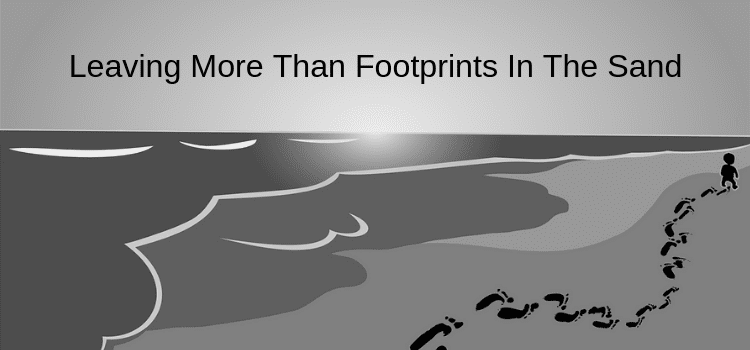
The figurative expression, footprints in the sand, can mean different things to different people.
For some, it has a religious and spiritual insight, while for others, it has a more pragmatic sense of something temporary and passing.
For writers and authors, it means leaving a temporary record of thoughts and feelings. But it can mean more.
“We writers, as we work our way deeper into our craft, learn to drop more and more personal clues. Like burglars who secretly wish to be caught, we leave our fingerprints on broken locks, our voiceprints in bugged rooms, our footprints in the wet concrete.” – Ross MacDonald
Our temporary digital world
Do you remember when asked what you would take with you if your house was on fire? The answer used to be your photo albums.
Nowadays, our precious family photos are stored in a mysterious electronic cloud owned and managed by a giant corporation.
History tells us that corporations are transient, temporary, and guided only by the law of profit.
Our precious memories are only secure for as long as we pay.

If you publish an ebook on Amazon, your words are kept in a small electronic file. The file is owned and encrypted by Amazon in its proprietary format to protect its profit.
It is entirely at Amazon’s whim that your ebook remains.
In only a few decades, we have learned that all things digital means temporary, subject to change, likely to go wrong, and extremely short-lived.
How useful now are all those secure backups of your photos that you did ten years ago on CD?
Like your footprints in the wet beach sand, the tide and flow of digital changes arrive all too soon and wash them away.
For my children’s children’s children

Books are the only way to leave your words to the next generation.
Luckily, it is very easy to self-publish a print-on-demand paperback or even a hardcover version of your books.
As much as I dislike the business practices of many vanity publishers, it is a viable yet costly way to produce a book.
But by whatever means, a book can be held in your hand and then passed on to someone because it is real.
For many authors, the primary goal is to sell books to make money.
But for others, it is about something much more important—the longevity of your words.
Some years ago, a friend noticed someone reading one of my books on a bus in Delhi, India.
As it turned out, the gentleman had bought my book from a street vendor.
Yes, it was a cheap pirated copy.
But it proved to me how far the printed word could travel.
Another friend told me she was cleaning out her books and planning to give most of them to a secondhand bookshop.
As she had a few of my books, she asked me if I wanted them back.
I said I didn’t but would be eternally grateful if she included them with all the rest destined for the secondhand bookshop.
Someone, somewhere, sometime might read them.
The longevity of the printed word

Giving copies of your real books to family and friends is the best way to make sure your words endure for a long time to come.
People keep books and hand them on. Real books live a long life.
If your book is available for sale, its reach can extend much further.
Sure, making a few dollars from one sale is nice, but after the buyer reads it, you never know where it could end up.
People rarely throw away books. Books travel.
An ebook? It comes with a delete option, so it can easily disappear forever.
It doesn’t matter if you have written a memoir, biography, or fiction. The only way to ensure that your words are not merely temporary is to publish a real book.
For authors, perhaps paperback self-publishing is the one small blessing to come out of the digital era. Print-on-demand publishing is inexpensive and relatively simple.
It is the only way to leave more than just your brief footprints.
The origins of footprints in the sand

The context and sense of the words correlate with things passing or shifting. But the original meaning was about spirituality.
The words come from the footprint poem by Mary Stevenson.
My article is about authors, but it is only fitting that I include the poem in full so you can understand the original meaning.
Footprints in the Sand
One night I had a dream.
I dreamed I was walking along the beach with the Lord.
Across the sky flashed scenes from my life.
For each scene, I noticed two sets of footprints in the sand, one belonging to me, and the other to the Lord.
When the last scene of my life flashed before me,
I looked back at the footprints in the sand.
I noticed that many times along the path of my life there was only one set of footprints.
I also noticed that it happened at the very lowest and saddest times in my life.
This really bothered me and I questioned the Lord about it:
“Lord, you said that once I decided to follow you, you’d walk with me all the way.
But I have noticed that during the most troublesome times in my life there is only one set of footprints.
I don’t understand why when I need you most you would leave me.”
The Lord replied:
“My precious child, I love you and would never leave you.
During your times of trial and suffering, when you see only one set of footprints, it was then that I carried you.”
By Mary Stevenson
Conclusion
Don’t trust technology with your treasures.
It offers fleeting security that will last only as long as it is profitable for a corporation to do so.
Or while you continue to pay your monthly subscription.
Protect your words, and ensure they can live for a very long time to come.
Related reading: The Best Fiction Story Ideas Often Come From A Simple Question
Share This Article



I really like the story. I had heard it before but forgotten it. I used the image of footprints ( on a pebbled beach) for my fourth book. ” Never Run Away.” The best thing about being a self publisher is being able to choose your own covers. We all want to leave a legacy of words and ideas and most of my books are not in ebook form. My kindle has stopped working so I stick to the library and second hand paperbacks!
That’s the best way, Julie. Let your books become secondhand paperbacks. :)
I’m already planning the bookshelf in my room at the old age home so I can lie in bed and look at them